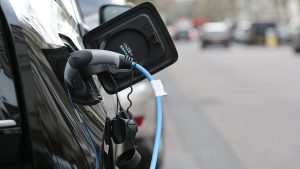DoE, Shell firms partner to study RE-powered EV charging stations

THE Energy department signed a tripartite memorandum of agreement with Pilipinas Shell Petroleum Corp. (PSPC) and Shell Energy Philippines, Inc. (SEPH) to conduct a study on electric vehicle charging stations (EVCs) powered by renewables.
“I commend PSPC and SEPH for collaborating with the DoE (Department of Energy) for this laudable undertaking — a sound testament of their resoluteness in maximizing value creation while contributing to global climate change mitigation,” Energy Secretary Raphael P.M. Lotilla said in a media release on Thursday.
The agreement was signed by Mr. Lotilla, PSPC President and Chief Executive Officer Lorelie Q. Osial, and SEPH President Bernd Krukenberg to help the country’s target of shifting to clean energy fuels and technologies by focusing on renewable energy (RE) such as solar.
Under the Philippine Energy Plan, the country is aiming to provide the needed infrastructure for the 10% penetration of electric vehicles (EVs).
The agreement covers the supply, installation, operation, and maintenance of EVCs. It also includes “monitoring and verification of energy efficiency, performance, and savings through the utilization of RE, and optimization of the use of cleaner energy.”
The DoE said that the result of the project will be used by the DoE to enhance and further develop its programs, and to craft the necessary policies and regulations for the incorporation and operation of EVCs using RE.
“These alternative opportunities could also position Shell at the forefront of their quest for sustainable and inclusive growth by adding a more compelling long-term vision for clean technologies and renewable energy investment into their portfolio,” Mr. Lotilla said.
The DoE said that the output from the pilot project could also help the two firms develop and launch their EVC network.
According to the Electric Vehicle Industry Development Act (EVIDA), the government must support the adoption of EVs and its support charging station infrastructure.
The revised implementing rules and regulations (IRR) of EVIDA, which was signed in 2022, also sets a 5% EV minimum share in corporate and government vehicle fleets, the provision of dedicated parking slots, the installation of charging stations in parking lots and gasoline stations, green routes, and support for domestic EV manufacturing.
Data provided by the DoE showed that as of end-2021, there are about 9,000 registered EVs, 378 of which are public utility vehicles, while 327 charging stations are deployed in the country. — Ashley Erika O. Jose




